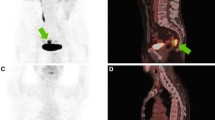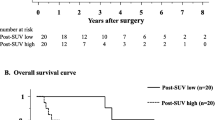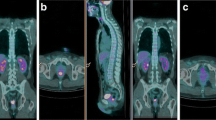Abstract
Purpose
Neoadjuvant radiochemotherapy (RCT) is an accepted treatment for locally advanced rectal cancer (LARC) that improves surgical outcomes. If a pathological complete response is achieved, conservative surgery can be considered. The objective of our study was to assess the reliability of 18F-FDG PET/CT for evaluating the response to neoadjuvant RCT in LARC.
Methods
We prospectively studied 41 patients diagnosed with LARC and candidates for neoadjuvant RCT. PET/CT was performed before RCT and again 7 weeks later. A visual and semiquantitative analysis was carried out. The pathological response was classified according to the Mandard tumour regression grade (TRG). We analysed: (a) the relationship between TRG and the result of the posttreatment PET/CT scan, and (b) the correlation between the percentage of pathological response and the percentage decrease in SUVmax according to the response index (RI).
Results
The mean SUVmax of the rectal lesions at diagnosis was 13.6 and after RCT 3.96. The mean RI was 65.32 %. Sensitivity was 88.88 %, specificity 92.86 %, positive predictive value 96 %, negative predictive value 81 %. Of the 41 patients, 8 had TRG I (all negative PET/CT); 6 had TRG II (5 negative, 1 positive PET/CT); 16 had TRG III (13 positive, 3 negative PET/CT); 9 had TRG IV (all positive PET/CT); 2 had TRG V (all positive PET/CT). Of the 14 patients classified as responders (TRG I, II), 13 (92.86 %) had negative PET/CT. Of the 27 patients classified as nonresponders (TRG III–V), 24 (88.88 %) had positive PET/CT. Differences were statistically significant (p < 0.0001). The RI in responders was 79.9 % and in nonresponders was 60.3 %. Differences were statistically significant (p < 0.037).
Conclusion
PET/CT is a reliable technique for assessing response to neoadjuvant RCT in LARC, with a view to considering more conservative surgical treatment. The combination of the visual and semiquantitative analysis increases the diagnostic validity of PET/CT.


Similar content being viewed by others
References
Booset JF, Collette L, Calais G, Minuer L, Maigon P, Radosevic-Jelic L, et al. Chemotherapy with preoperative radiotherapy in rectal cancer. N Engl J Med. 2006;355:1114–23.
De Paoli A, Chiara S, Luppi G, Friso ML, Beretta GD, Del Prete S, et al. Capecitabine in combination with preoperative radiation therapy in locally advanced, resectable, rectal cancer: a multicentric phase II study. Ann Oncol. 2006;17:246–51.
Graf W, Dahlberg M, Osman MM, Holberg L, Palhlman L, Glimelius B. Short-term preoperative radiotherapy results in down-staging of rectal cancer: a study of 1316 patients. Radiother Oncol. 1997;43:133–7.
Janjan NA, Khoo VS, Rich TA, Evetts PA, Goswitz MS, Allen PK, et al. Locally advanced rectal cancer: surgical complications after infusional chemotherapy and radiation therapy. Radiology. 1998;206:131–6.
Peeters KC, Marijnen CA, Nagtegaal ID, Kranenborg EK, Putter H, Wiggers T, et al. The TNM trial after a median follow-up of 6 years: increased local control and survival benefit in irradiated patients with resectable rectal carcinoma. Ann Surg. 2007;246:693–701.
Read TE, McNevin MS, Gross EKM, Whiteford HM, Lewis JL, Ratkin G, et al. Neoadjuvant therapy for adenocarcinoma of the rectum: tumor response and acute toxicity. Dis Colon Rectum. 2001;44:513–22.
Crane CH, Skibber JM, Feig BW, Vauthey JN, Thames HD, Curley SA, et al. Response to preoperative chemoradiation increases the use of sphincter-preserving surgery in patients with locally advanced carcinoma. Cancer. 2003;97:517–24.
Moore HG, Gittleman AE, Minsky BD, Wong D, Paty PB, Weiser M, et al. Rate of pathologic complete response with increased interval between preoperative combined modality therapy and rectal cancer resection. Dis Colon Rectum. 2004;47:279–86.
Vecchio FM, Valentini V, Minsky BD, Padula GD, Venkatraman ES, Balducci M, et al. The relationship of pathologic tumor regression grade (TRG) and outcomes after preoperative therapy in rectal cancer. Int J Radiat Oncol Biol Phys. 2005;62:752–60.
Bujko K, Michalski W, Kepka L, Nowacki MP, Nasierowxka-Guttmejer A, Tokar P, et al. Association between pathologic response in metastatic lymph nodes after preoperative chemoradiotherapy and risk of distant metastases in rectal cancer: an analysis of outcomes in randomized trial. Int J Radiat Oncol Biol Phys. 2007;67:369–77.
Habr-Gama A, Perez RO, Nadalin W, Sabbaga J, Ribeiro Jr U, Silva e Sousa Jr AH, et al. Operative versus nonoperative treatment for stage 0 distal rectal cancer following chemoradiation therapy: long-term results. Ann Surg. 2004;240:711–7. discussion 717–8.
Habr-Gama A, Perez RO. Non-operative management of rectal cancer after neoadjuvant chemoradiation. Br J Surg. 2009;96:125–7.
Bujko K, Sopylot R, Kepka L. Local excision after radiochemotherapy for rectal cancer: is it safe? Clin Oncol. 2007;19:693–700.
Lezoche E, Guerrieri M, Paganini AM, et al. Long term results in patients with T2-3 N0 distal rectal cancer undergoing radiotherapy before transanal endoscopic microsurgery. Br J Surg. 2005;92:1546–52.
Chen CC, Lee RC, Lin JK, Wang LW, Yang SH. How accurate is magnetic resonance imaging in restaging rectal cancer in patients receiving preoperative combined chemoradiotherapy? Dis Colon Rectum. 2005;48:722–8.
Rau B, Hunerbein M, Barth C, et al. Accuracy of endorectal ultrasound after preoperative radiochemotherapy in locally advanced rectal cancer. Surg Endosc. 1999;13:980–4.
Guillem JG, Puig-La Calle Jr J, Akhurst T, Tickoo S, Ruo L, Minsky BD, et al. Prospective assessment of primary rectal cancer response to preoperative radiation and chemotherapy using 18-fluorodeoxyglucose positron emission tomography. Dis Colon Rectum. 2000;43:18–24.
Capirci C, Rubello D, Chierichetti F, Crepaldi G, Carpi A, Nicolini A, et al. Restaging after neoadjuvant chemoradiotherapy for rectal adenocarcinoma: role of F18-FDG PET. Biomed Pharmacother. 2004;58:451–7.
Kristiansen C, Loft A, Berthelsen AK, Graff J, Lindebjerg J, Bisgaard C, et al. PET/CT and histopathologic response to preoperative chemoradiation therapy in locally advanced rectal cancer. Dis Colon Rectum. 2008;51:21–5.
Koike I, Ohmura M, Hata M, Takahashi N, Oka T, Ogino I, et al. FDG-PET scanning after radiation can predict tumor regrowth three months later. Int J Radiat Oncol Biol Phys. 2003;57:1231–8.
Maas M, Rutten JG, Nelemans PJ, Lambregts D, Cappendijk V, Beets G, et al. What is the most accurate whole-body imaging modality for assessment of local and distant recurrent disease in colorectal cancer? A meta-analysis. Eur J Nucl Med Mol Imaging. 2011;38:1560–71.
Mandard AM, Dalibard F, Madard JC, Marnay J, Henry-Amar M, Petiot JF, et al. Pathologic assessment of tumor regression after preoperative chemoradiation therapy of esophageal carcinoma. Clinicopathologic correlations. Cancer. 1994;73:2680–6.
Dhadda AS, Dickinson P, Zaitoun AM, Gandhi N, Bessell EM. Prognostic importance of Mandard tumour regression grade following pre-operative chemo/radiotherapy for locally advanced rectal cancer. Eur J Cancer. 2011;47:1138–45.
Swedish Rectal Cancer Trial. Improved survival with preoperative radiotherapy in resectable rectal cancer. N Engl J Med. 1997;336:980–7.
Capirci C, Rampin L, Erba PA, Galeotti F, Crepaldi G, Banti E, et al. Sequential FDG-PET/CT reliability predicts response of locally advanced rectal cancer to neoadjuvant chemo-radiation therapy. Eur J Nucl Med Mol Imaging. 2007;34:1583–93.
Kalff V, Duong C, Drummond EG, Matthews JP, Hicks RJ. Findings on 18F-FDG PET scans after neoadjuvant chemoradiation provides prognostic stratification in patients with locally advanced rectal carcinoma subsequently treated by radical surgery. J Nucl Med. 2006;47:14–22.
Cascini GL, Avallone A, Delrio P, Guida C, Tatangelo F, Marone P, et al. 18F-FDG PET is an early predictor of pathologic tumor response to preoperative radiochemotherapy in locally advanced rectal cancer. J Nucl Med. 2006;47:1241–8.
Capirci C, Rubello D, Pasini F, Galeotti F, Bianchini E, Del Favero G, et al. The role of dual-time combined 18-fluorodeoxyglucose positron emission tomography and computed tomography in the staging and restaging workup of locally advanced rectal cancer, treated with preoperative chemoradiation therapy and radical surgery. Int J Radiat Oncol Biol Phys. 2009;74:1461–9.
Sánchez R. Utilidad del estudio 18F-FDG PET/TAC en la valoración de la terapia neoadyuvante en el cáncer de recto. Tesis Doctoral. Departamento de Radiología y Medicina Física. Universidad de Granada. 2009.
Melton GB, Lavely WC, Jacene HA, Schulick RD, Choti MA, Wahl RL, et al. Efficacy of preoperative combined 18-fluorodeoxyglucose positron emission tomography and computed tomography for assessing primary rectal cancer response to neoadjuvant therapy. J Gastrointest Surg. 2007;11:961–9.
Conflicts of interest
None.
Author information
Authors and Affiliations
Corresponding author
Rights and permissions
About this article
Cite this article
Murcia Duréndez, M.J., Frutos Esteban, L., Luján, J. et al. The value of 18F-FDG PET/CT for assessing the response to neoadjuvant therapy in locally advanced rectal cancer. Eur J Nucl Med Mol Imaging 40, 91–97 (2013). https://doi.org/10.1007/s00259-012-2257-y
Received:
Accepted:
Published:
Issue Date:
DOI: https://doi.org/10.1007/s00259-012-2257-y




